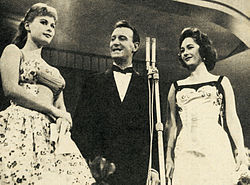| Nunzio Filogamo | |
|---|---|
 Filogamo between Marisa Allasio (left) and Fiorella Mari (right) at the Sanremo Music Festival 1957 Filogamo between Marisa Allasio (left) and Fiorella Mari (right) at the Sanremo Music Festival 1957 | |
| Born | (1902-02-20)20 February 1902 Palermo, Kingdom of Italy |
| Died | 24 January 2002(2002-01-24) (aged 99) Rodello d'Alba, Italy |
| Occupation(s) | television and radio presenter |
Nunzio Filogamo (Italian pronunciation: [ˈnuntsjo fiˈlɔːɡamo]; 20 September 1902 – 24 January 2002) was an Italian television and radio presenter, actor and singer.
Life and career
Born in Palermo, Filogamo moved to Turin at a young age, then he studied law at the Sorbonne University and at the Turin University, where he graduated.
After working for two years as a lawyer, he started a career as a stage actor, entering the companies of Dina Galli and Irma and Emma Gramatica. In 1934 he debuted as a radio actor in the variety show I quattro moschettieri, which lasted four years and gave him a large popularity.
After the outbreak of war, Filogamo was hired to host several variety events for soldiers and wounded people; later, he continued to work as a presenter of the shows reserved for the Allied forces which were held at the Teatro dell'Opera in Rome.
Filogamo's fame is mainly linked to the Sanremo Music Festival, of which he hosted five editions including the first ever. During the second edition of the Festival he coined the famous slogan "Dear friends, near and far, good evening. Good evening wherever you are", which soon became his trademark.
After hosting several television and radio programs, he retired in the 1970s. During his career Filogamo was also an occasional film actor and a singer; among his best-known songs, "Tutto va bene madama la marchesa" and "Povero cagnolino pechinese".
He died, at 99, in a retirement home in Rodello d' Alba, Province of Cuneo.
Filmography
| Year | Title | Role | Notes |
|---|---|---|---|
| 1933 | Non c'è bisogno di denaro | ||
| 1935 | Il serpente a sonagli | Il maestro di balla | |
| 1937 | The Countess of Parma | Conte di Sebasta | |
| 1940 | Ecco la radio! | ||
| 1940 | Una famiglia impossibile | ||
| 1943 | C'è sempre un ma! | ||
| 1943 | La vita torna | Cortese, Il regista | |
| 1947 | Les beaux jours du roi Murat | Uncredited | |
| 1948 | How I Lost the War | Il venditore di cappelli | |
| 1949 | Adam and Eve | Il naufrago francese | |
| 1949 | Il vedovo allegro | ||
| 1949 | How I Discovered America | Il prete | |
| 1951 | Miracolo a Viggiù | ||
| 1951 | The Two Sergeants | ||
| 1951 | Il microfono è vostro | ||
| 1963 | Urlo contro melodia nel Cantagiro '63 | ||
| 1964 | La guerra dei topless |
References
- ^ Roberto Rombi (25 January 2002). "Addio Nunzio Filogamo amico vicino e lontano". La Repubblica. Retrieved 6 January 2014.
- ^ Redazione (25 January 2002). "E' morto Nunzio Filogamo voce della Rai d'altri tempi". La Repubblica. Retrieved 6 January 2014.
- ^ Aldo Grasso, Massimo Scaglioni, Enciclopedia della Televisione, Garzanti, Milano, 1996 – 2003. ISBN 881150466X.
- ^ Eddy Anselmi (2009). Festival di Sanremo: almanacco illustrato della canzone italiana. Panini Comics, 2009. ISBN 978-8863462296.